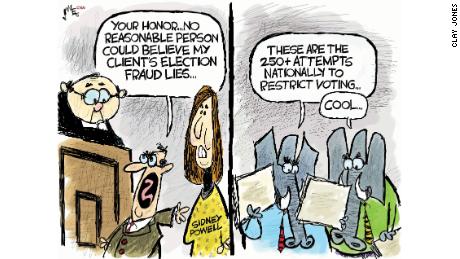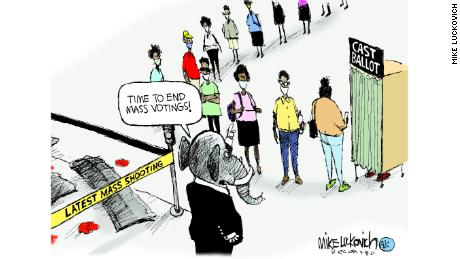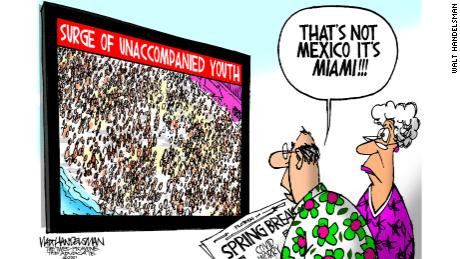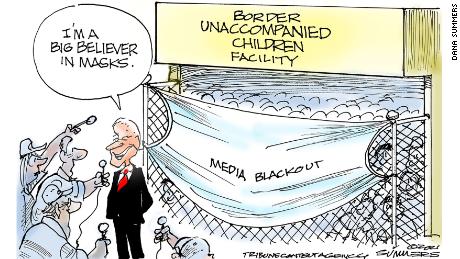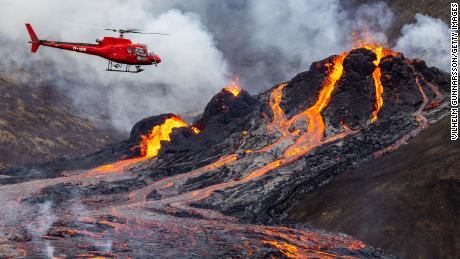Actually, at least one thing definitely did stick to Reagan: Schroeder’s label. And Teflon, discovered by accident in a DuPont lab in 1938, proved versatile as a political tag. President Bill Clinton, for example, was “teflonish,” Schroeder
told CNN’s Charles Bierbauer in 1997.
Reagan’s grandfatherly mien and Hollywood stage presence helped him weather two terms in office, though he did shoulder blame for many controversies. With President Joe Biden two-thirds of the way through his first 100 days, one emerging question is where he will ultimately land on the Teflon scale: as a president stuck with blame for the crises occurring on his watch — or one who largely manages to avoid it?
All around him, difficulties abound —a struggling economy he’d like to push toward a big recovery, the complicated rollout of an enormous Covid-19 vaccination program, the aftermath of mass shootings — a week apart — in Colorado and metro Atlanta, a surge of unaccompanied children over the southern border.
“Buffeted by
unanticipated events and lines of questioning — and complicated by the President’s tendency to occasionally drift off point — the White House communications machine is hard to control,” wrote
David Axelrod before the press conference.
Still, Biden enjoys approval ratings much higher than Donald Trump ever achieved — an average of 54%, according to
FiveThirtyEight.
The President is putting his focus on touting the benefits of the $1.9 trillion Covid relief bill he maneuvered through Congress without any Republican support and aiming to build on it with an infrastructure plan, possibly as big as $3 trillion, he promises to announce this coming week in Pittsburgh. But many of his initiatives, along with a measure to buck new state GOP clampdowns on voting access, may be blocked by Republicans using the Senate filibuster.
Biden told reporters the “filibuster was being abused, apparently not recognizing that his own party, a minority in the US Senate for the last six years, used it quite liberally during the Trump administration,” wrote
Scott Jennings. “In fact, he took it a step further and said he agreed with former President Barack Obama that the filibuster was ‘a relic of the Jim Crow era.’
Does he not remember his 2005 Senate speech passionately defending the filibuster?“
Yet many agree with Obama in connecting the filibuster to Jim Crow. In Salon,
Amanda Marcotte wrote that Republicans are depending on the filibuster to keep any bill “to secure voter rights” from passage in the Senate. “After Donald Trump, the GOP understands their party exists because of racism and white grievance. Rather than try to moderate those views and appeal to more diverse voters,
they instead are laser-focused on trying to prevent people of color from exercising their right to vote.”
As Nicole Hemmer pointed out, “Jim Crow, a name derived from racist minstrel shows that would come to stand in for the entire segregationist regime of the South, emerged in the late 19th century as a series of anti-Black laws: laws that stripped Black men of the right to vote, segregated public spaces, barred Black people from certain types of jobs.” Stacey Abrams has called Georgia’s new voter restrictions law “a redux of Jim Crow in a suit and tie.” But Hemmer noted that Jim Crow “never really went away.”
Jim Crow “marches hand in hand with both state violence and mob violence, as we were once again reminded during the insurrection at the Capitol. In fact, it’s precisely because
Jim Crow has always been clothed in respectability during the day and worn a hood at night that we should be on alert when we see a Jim Crow-like figure in a business suit, because if history is any indication, that’s not the only way we’ll see him before all is said and done.”
Seven mass shootings in seven days
A man carrying a semiautomatic weapon killed 10 people at a Boulder, Colorado supermarket Monday. As
SE Cupp noted, it “was the seventh mass shooting in seven days. That is a nauseating number. It’s also a wake-up call. The Boulder shooting, which followed the Atlanta spa shooting,
is an awful reminder that we have not come close to solving our gun violence problem in this country.”
To do so, she argued, the US should have comprehensive background checks of gun buyers, an improved database of criminals, more studies of gun violence and safety and better ways to stop people with mental health issues from acquiring guns.
“Congress and the President should pass common-sense gun control laws, complete with stringent background checks, and an assault weapon ban that would reduce the likelihood of mass shootings and gun violence,” wrote
Peniel E. Joseph. “Our public schools and institutions of higher education should be leading
a national, data-driven conversation about gun violence as a national public health crisis.”
In the metro Atlanta region, families are grieving the loss of eight people, six of them Asian American women, in last week’s shooting at three spas. The killings,
Pawan Dhingra wrote, came after “months of mounting concerns over anti-Asian violence during the coronavirus pandemic.” He argued “the federal response is woefully inadequate when it comes to preventing violence against Asian Americans. In order to effect lasting and meaningful change, we need an educational campaign starting in K-12 schools that
reveals the strength and complexity of Asian Americans — just like any humans. People’s lives depend on it.”
The little red icon
Annika Olson‘s dream is to buy a house in the “absolutely bonkers” real estate market of Austin, Texas. The 26-year-old checks new listings before work. “I look at a house one day, and the next day a little red icon says “pending.” … In short, I’m toast.”
“I’ve scrimped and saved for years, working for AmeriCorps for $1,000 a month and doing everything I could to build up my credit score and savings account so I could buy a house.
But with inventory so low, it barely seems possible.”
Millennials, already hard hit by the pandemic downturn, are getting shut out of many other cities due to high prices, she wrote. “We, as a country, need to find a way to allow young people a slice of the pie, an opportunity to grow their wealth and invest in something that is important for their future.”
Florida man’s boast
The wars of the 20th century were personally disastrous for many people in Britain — but not for everyone. Hence the phrase that became popular to describe those who came through them with an enhanced reputation: he or she
“had a good war.” We’re beginning to see people claim to have had a good pandemic. For example, Florida Gov.
Ron DeSantis wrote in the Wall Street Journal that “Florida cut against the grain of elite opinion and bucked the media narrative. The result is open schools, comparatively low unemployment and per capita Covid mortality below the national average.”
Dr.
Kent Sepkowitz, an infectious disease specialist, isn’t buying it. “As of March 22, over the last seven days, Florida
has had the most Covid-19 cases in the country, according to data from the US Centers for Disease Control and Prevention (CDC), the 12th highest per capita case-rate, the fourth highest number of deaths, and the 17th highest death rate.”
New York’s lieutenant governor,
Kathy Hochul, pointed to the pandemic’s continuing impact on women. “When the Covid-19 tsunami hit us one year ago, the tidal wave swept over our most vulnerable. Now left in the wake are
women of all ages struggling because for them, this pandemic has been a living hell.”
For more on Covid-19’s impact:
The ramifications of former President Donald Trump’s big lie that the election was stolen from him continue to ripple out. Prosecutors have charged hundreds of people with crimes as a result of the Jan. 6 insurrection at the Capitol.
Sidney Powell, a former Trump lawyer responsible for some of the most outlandish and groundless allegations about the election, is trying to defend herself from a $1.3 billion defamation lawsuit from Dominion Voting Systems (the company also filed a suit against Fox News Friday).
“Powell now argues that she did not defame Dominion because her statements were not factual in nature at all, but instead were merely her opinions,”
Jennifer Rodgers wrote. But Powell was doing more than just offering her opinion. She and her colleagues “were doing everything in their power to convince Trump’s supporters that the election was stolen from him through fraud.
They created and fed the big lie.”
Despite all of the video evidence to the contrary, Trump claimed on Fox News that the Jan. 6 riot “was zero threat. Look, they went in, they shouldn’t have done it. Some of them went in, and they are hugging and kissing the police and the guards, you know, they had great relationships.”
As
Michael D’Antonio pointed out, “While one officer appeared to pose for a selfie with a rioter and others opened the barricades to allow the mob to enter the grounds of the US Capitol, many Capitol and DC Metro police officers also risked their lives and engaged in hand-to-hand combat trying to protect the lawmakers who were certifying the results of the 2020 election inside. During the melee, some officers were beaten and sprayed with chemicals.
At least 138 sustained injuries including burns, concussions and rib fractures. Capitol Police Officer Brian Sicknick died from injuries sustained during the attack, and two others later died by suicide.”
Meanwhile, an adviser said Trump is readying a new social platform to air his views, now that he has been banned from Twitter. “Trump hates not being heard,” wrote
Julian Zelizer. “But it won’t be easy for him to regain his hold.
After all, the former president is now officially a political loser.”
A 1,300-foot container ship called Ever Given gave the world of international shipping a body blow Wednesday. It ran aground in the Suez Canal, a waterway that carries 12% of the world’s shipping, and blocked traffic, stranding hundreds of ships.
“A failure of machinery, human error or natural events — high winds and reduced visibility — may have caused Ever Given to run ashore in the Suez Canal,” wrote Salvatore R. Mercogliano, a history professor and former merchant mariner.
“But
its impact will resonate far from its banks as it has blocked the jugular of one of the largest trade routes in human history.”
Don’t miss
Fagradalsfjall is no Eyjafjallajökull
People around the world are spending an uncountable number of hours watching webcams of Iceland’s Fagradalsfjall volcano “which woke up this month after 700 years and is putting on a mesmerizing lava show,” wrote Einat Lev of Columbia University’s Lamont-Doherty Earth Observatory. “They are calling it a Disneyland eruption.”
In 2010, plumes from the Eyjafjallajökull eruption severely disrupted air travel, and in 1783, the Laki volcano “released so much sulfur dioxide and other toxic gases over eight months that about 9,000 people in Iceland died — about a quarter of the population. It changed the weather and caused more deaths across Europe.”
What will happen to the new, and so far mild, Iceland eruption? Lev wrote, “Nobody knows now whether it will stop in a few days or continue for years and become an unparalleled tourist attraction.”

